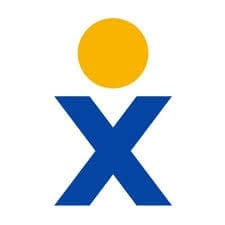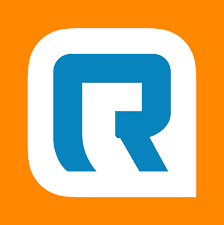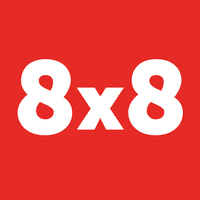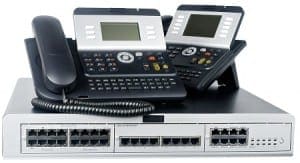How Much Do Business Phone Systems Cost in 2025?
In 2025 online business phone systems cost around $15 per user per month, while on-premises solutions cost around $750 per user. Here’s what you need to know.

Cloud-based phone systems used to be exclusive to large businesses. As small and medium-sized businesses have learned the value of this technology though, many are making the switch.
When comparing phone systems, it’s important to weigh the pros and cons of traditional vs. cloud-based systems. For instance, businesses have seen a reduction in fees with a cloud-based phone system. These systems reduce local costs by 40% and international costs by up to 90%.
Is the switch to a cloud phone system right for your business? Before making a switch, take some time to compare the price of business phone systems.
Cloud Phone Providers and Prices
 PhonePower
PhonePower
Phone Power has the cheapest base plan option. For a one-year prepay plan, you can get a non-international plan for $8.33 per month. This plan includes:
- Phone number transfer
- Free second line
- Unlimited calling to the U.S., Canada, and Puerto Rico
- 60 minutes per month of international calls free
- e-fax
- call waiting, holding, and transfer
- conference calling
- no set-up fee
There are about 45 features included in the basic plan. To get a no-contract plan, the price is $19.95 per month and includes the same features as the contract plan. For international plans, the price ranges from $20 to $50 depending on the number of countries included.
 Phone.com
Phone.com
Phone.com provides a cheap pay-per-minute option for a basic plan. The base plan starts at $12.99 per month. The features included in this base price include:
- A local or toll-free number.
- Standard features including account management, call waiting, and voicemail to email.
- Unlimited extensions.
- 300 monthly minutes.
- 5,000 SMS messages.
- 24/7 customer support.
There are about 40 standard features included in the base plan. To get some features such as call recording, video conference, hold music, or voicemail to text, a premium or unlimited plan is required. Premium plans can range from $20 to $60 depending on the extra services and features required.
 Nextiva
Nextiva
While Phone.com provides a pay-per-minute plan, Nextiva’s cheapest option is a basic unlimited plan. The basic plan starts at $19.95 per month. This plan includes:
- Free local and toll-free number.
- Voicemail to email or to text.
- Virtual faxing
- Hold music
- Call monitoring
- Unlimited extensions
- Phone number transfer
- Unlimited calling
- Easy account management
For other features such as greetings, conference calls, and call recording, a premium plan is required. Nextiva does not require a set-up fee for any of the plans. Premium plans can range from $20 to $28 depending on the features your business requires.
 Ring by Name
Ring by Name
Ring by Name is another unlimited plan service provider. The cheapest option available is $24.95 per month. This plan includes:
- Free local and toll-free numbers
- Voicemail to email
- Hold music
- Call routing
- Remote pick-up
- Call waiting and screening
- Unlimited calls to U.S. and Canada
- Conference calling
- 24/7 support
- Phone number transfer
- No set-up fee
This plan also offers text-to-speech and other bonus features. For features such as efax or call recording, a premium plan is required.
Premium plans range from $35 to $45. There are other features available for an extra monthly fee.
 RingCentral
RingCentral
Possibly the best option on the market today, RingCentral provides an unlimited plan starting at $19.99 per month. This plan is available for up to 10 users. Features for this basic plan include:
- A toll-free number with up to 100 minutes for free.
- Unlimited local calls.
- Unlimited conference calls and video for up to four people.
- Unlimited texting
- Remote access
- Mobile access
- Voicemail to email
- File sharing
- 24/7 customer support
For other features such as faxing, call monitoring, call reporting, and unlimited users a premium plan is required. Premium plans range from $25 to $50. Other features such as extra numbers and international calling are available for additional fees.
 8×8 Cloud Service
8×8 Cloud Service
8×8 provides an unlimited plan that includes 14 countries in the base plan. The base plan starts at $28. The features for the basic plan include:
- Free phone number and extensions
- Unlimited calls in the U.S. and 14 other countries
- Conference calling and video for up to 100 participants
- Texting
- Faxing
- Remote and mobile access
- Call recording
- Easy integration with CRMs.
- Analytics tools
The countries included in the basic plan include U.S., Canada, UK, Puerto Rico, France, Germany, Australia, Italy, Switzerland, Spain, Sweden, Ireland, New Zealand, and the Netherlands.
For other features such as call recording, switchboard, chat, and advanced customer support you will have to purchase a premium plan. Premium plans range from $48 to $175. The premium plans include 33 other countries for unlimited calling.
What is a Cloud-Based Phone System?
You’ve probably heard the term Voice over IP (VoIP) before. This basically means making phone calls over the internet rather than over phone lines. Cloud-based phone systems use VoIP technology to provide your phone service.
Cloud-based phone systems have existed since the 90s, but the technology and features have changed drastically over time. Now companies are not required to keep hardware on-site to run their VoIP systems, making it easier for more companies to gain access to the technology.
The cloud-based phone system provides greater security and less maintenance because the system is hosted outside of your business with server redundancy. The cloud phone system provides more flexibility and ease of use for your employees.
The up-front cost is more expensive, as VoIP friendly hardware is required. You can make up this investment over the long-term though with lower monthly costs and fees for needed features.
The Benefits of a Cloud Phone System
A cloud-based phone system has several benefits over traditional business phone plans. These benefits include:
- Many special features are included in the monthly cost.
- The cloud-based system can grow with your business.
- Reduced long-distance and international costs.
- Allows for remote access.
- Increased security.
- No software maintenance.
- Easy set-up.
Most cloud-based phone systems include features such as an auto-attendant, call monitoring and recording, speed dial, call transfer, conference calling, call return and other useful services in the base fee. Some features require additional fees, but you only have to purchase what you need.
A cloud phone system allows you to start with a basic plan and add new features as your business grows. This means the system can grow with your business without requiring a whole new system.
A cloud-based phone system also gives you flexibility. With options to access your business system from anywhere, including your cell phone, you can work from anywhere. Cloud-based systems make it easier to hire remote workers which can cut down on overhead costs.
The cloud-based business phone system also gives your business increased security. The plan is hosted on outside servers so you don’t have to worry about hackers. There is also built-in redundancy so if one server goes down you still have access to your system.
Many cloud phone providers also offer 24/7 support so you can get help whenever you need it. They also provide easy set-up so you can get your system running quickly.
Cloud Phone System Prices – What to Look For
When comparing cloud phone system prices, it’s important to look at several factors.
- Minimum costs
- Minutes provided
- Set-up and service fees
- Local, long-distance, and international rates
- Cancellation fees
- Price of the required hardware
- Carrier and line fees
Each service provider will have different base rates, and these will include different features. When picking a cloud phone system, keep your business needs in mind when comparing the prices and features. While some systems have higher monthly fees, these usually include more base features.
Basic Features
Most cloud-based systems will provide some basic features and support in their base monthly fees. When comparing systems, make sure your basic plan includes a toll-free number.
Some other basic features to look for include:
- Call monitoring and recording
- Call transfer
- Conference calling
- Speed dial
- Call blocking
- Call return
- Find me- to transfer to another line if the call goes unanswered
The monthly fees for systems with basic features range from $22-$35. Providers that offer 24/7 support may cost more than other providers.
Remember that costs are also based on the number of lines required for your business. Make sure you pay attention to the maximum number of users for each plan before making your purchase.
On Premise Business Phone Systems
On-premise business phone systems are communication setups where the hardware and software required to run the system are located within the physical premises of the business. There are several options available for on-premise business phone systems, each with its own set of features and advantages:
- Private Branch Exchange (PBX) Systems:
- Traditional PBX systems use analog or digital phone lines and are known for their reliability and range of features like call forwarding, voicemail, and conference calling.
- IP PBX systems, a more modern version, use VoIP (Voice over Internet Protocol) technology and offer more advanced features like integration with CRM systems, voicemail-to-email, and remote connectivity.
- Key Systems:
- Key systems are simpler than PBX and are typically used by small businesses with fewer than 50 employees.
- They offer basic features like hold, line switching, intercom, and can sometimes be less expensive than PBX systems.
- VoIP Systems:
- VoIP systems use the internet to make calls, reducing the cost of long-distance and international calls.
- They offer advanced features like video conferencing, mobile integration, and unified communications.
- Hybrid Systems:
- Hybrid systems combine the features of traditional analog systems with VoIP technology, allowing businesses to gradually transition to internet-based telephony while still using their existing phone lines.
- These are ideal for businesses looking to modernize their communication systems without a complete overhaul.
- Unified Communications Systems:
- These systems integrate various communication methods like voice, video, text, and email into a single platform.
- They are ideal for businesses that require seamless communication across multiple channels and devices.
Each of these systems has its own set of pros and cons, and the best choice depends on the specific needs, size, and budget of the business. For example, a small startup might prefer a basic key system due to its simplicity and cost-effectiveness, while a larger corporation might need the advanced features and scalability of a unified communications system.
Comparing Business Phones is About More than Price
Remember, you get what you pay for. While it’s tempting to choose the cheapest option, choosing the wrong plan for your business needs may cost you more in the long-term.
When choosing a plan consider both your current and future business needs. Pick a plan that can grow with your company plans and growth. Take the time to consider the needs of a growing company.
FEATURES
You may also want to consider features that can help your business grow. Features such as click-to-call can help reach potential customers you might not otherwise reach. While this feature is included in some plans, it’s not included in all of them.
Also, consider ease of use and access for employees. Features such as mobile access or software download for remote access are important for businesses with remote or traveling employees.
When choosing a cloud-based phone system don’t just compare the prices of different providers. Make sure you also compare the prices of the different plan options and how those plans fit in with your company.
Choosing the Best Phone Services for Your Business
If you’re pricing business phone systems, you may also want to look into some of the other service options to help automate and grow your business. Services such as answering services, time-tracking, or payroll processes are great options to help you make the day-to-day business easier. Even if all you need is a cloud-based phone system, you may need help figuring out which system is right for you.
If the idea of pricing phone systems seems daunting to you, let us help you compare your options. We have done the hard work. Our buyer’s guides have all the comparison information you need for a one-stop shopping process.
If you’re ready to compare your options to find the best cloud-based phone system for your business, contact us for an easy quote process. By providing us with some basic information about your business needs, we can help you find a plan that will work.
Office Phone Sample Costs
Below are a few examples of price facts for Business Phone Systems which will give you an idea of how much you will pay for your purchase. Features of small business phone systems are designed to help business owners and their employees work smarter and faster.
- PBX telephone systems support offices with an excess of 40 employees and are priced at $757 to $1,150 per user.
- A key system (for offices with under 50 employees) shows which lines are in use and offers many telecom features costing between $250 to $1,175 per employee.
- KSU-less phone systems for 3-10 employees cost $86 to $275 per employee.
Having a reliable and efficient business phone system is becoming increasingly important for businesses of all sizes. Let’s explore the different types of systems available, discuss their features, and provide tips on how to select the best system for your business needs. Additionally, we’ll provide advice on how to make sure that your system works optimally and can help you keep in touch with your customers and staff.
Find Business Phone Systems Near You and Compare Up To Five Money Saving Quotes
People That Viewed This Page Also Found These Pages Helpful:
Hosted PBX Systems
IVR Solutions
VoIP Phone Systems
 PhonePower
PhonePower
 Phone.com
Phone.com Nextiva
Nextiva Ring by Name
Ring by Name RingCentral
RingCentral 8×8 Cloud Service
8×8 Cloud Service